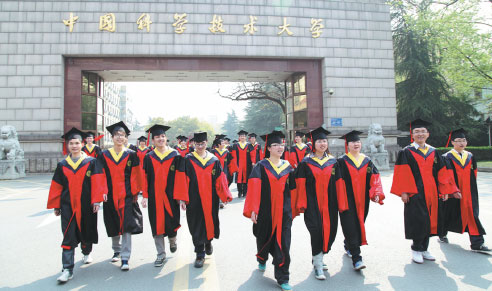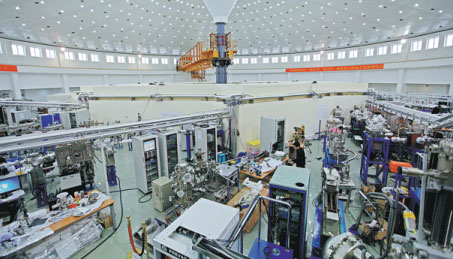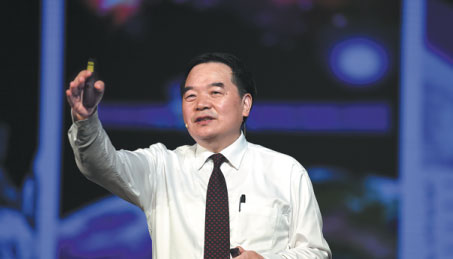USTC scales 'peak of science' with top talents
World-renowned university commands widespread respect with prominent alumni in 61 years
For Hefei-based University of Science and Technology of China (USTC), the call "to scale the peak of science" in its school song, The Eternal Wind from the East, has been an inspiration.
Established 61 years ago, the world-renowned USTC has made educating top students with a noble ethic its fundamental task, while sticking to its mission of "promoting science and education to serve the country and society."
Among its some 140,000 graduates by the end of last year, USTC has nurtured 73 academicians for the Chinese Academy of Sciences (CAS) and the Chinese Academy of Engineering, 32 top officers at major general rank or above in the field of science and technology, as well as numerous leading scientific and technological professionals and tech entrepreneurs.
Regarded as the "Cradle of Scientific Elites" in China and ranked No 3 in China in the US News University Rankings 2019, USTC has the highest percentage of alumni, among Chinese universities, who were elected as academicians for the two academies.
In 1958, CAS established USTC in Beijing to meet China's needs to increase its international competitiveness. USTC came into being with an aim of educating top talent in cutting-edge sciences and technologies. Authorities called the move "a great event in the history of education and science of China". In 1970, USTC moved to its current location in Hefei, Anhui province.
USTC President Bao Xinhe said that "it is imperative for USTC to focus on cultivating top talent with a noble ethic, persist in making breakthroughs, create a good environment for innovation and work hard on basic research".
Since the beginning of this year, USTC staff members have published 12 papers in the world's top three journals - Cell, Nature and Science - which is rare among colleges and universities nationwide.
Weng Qingxiong, vice-dean of the International Finance Research Institute of USTC, said: "We will accelerate the cultivation of innovative talent, promote the application of scientific and technological achievements and contribute to the vigorous development of new technologies and high-quality economic growth."
Enjoying an excellent reputation worldwide, USTC has a glorious history.
It has accomplished several "firsts" in China. USTC established the first graduate school, initiated the first class for gifted young people and built the first "big science facility" in China - the Hefei Synchrotron Radiation Facility.
As one of the most important innovation centers in China, it operates two important national labs; the National Synchrotron Radiation Laboratory and the Hefei National Laboratory for Physical Sciences at the Microscale. It also jointly operates two national "big science" facilities with CAS institutes; the Experimental Advanced Superconducting Tokamak and the Steady High Magnetic Field Facility of the High Magnetic Field Laboratory.
USTC is also one of the world leaders in fields such as quantum manipulation, nanotechnology, high-temperature superconductivity, speech processing, fire science and life science.
With an academic staff of 2,047 (including 651 full professors), USTC now has 7,388 undergraduates and 16,977 graduates, including 5,705 PhD candidates.
In September 2018, USTC celebrated its 60th anniversary. CAS President Bai Chunli - who is also honorary president of USTC - said the university had become an important force in China's higher education and it should continue to create new achievements.
Speaking at the celebration, Li Jinbin, secretary of Anhui Provincial Committee of the Communist Party of China, said that with its large number of world-class masters and a reputation of "the cradle of talents and the center of innovation," USTC is the pride of Anhui province and of China.
According to USTC News Center, since China's reform and opening-up in 1978, a large number of USTC alumni traveled abroad for further study. Upon return, they worked in all walks of life and made great contributions to China like stars twinkling in the sky.
yuanshenggao@chinadaily.com.cn
|
Fresh graduates pass the gates of the University of Science and Technology of China.Photos Provided To China Daily |
|
|
|
Bao Xinhe, president of the University of Science and Technology of China, delivers a speech.Dai Rui/for China Daily |
(China Daily 11/22/2019 page12)

















